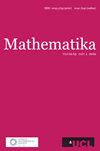On strong chains of sets and functions
IF 0.8
3区 数学
Q2 MATHEMATICS
引用次数: 1
Abstract
Shelah has shown that there are no chains of length ω3 increasing modulo finite in . We improve this result to sets. That is, we show that there are no chains of length ω3 in increasing modulo finite. This contrasts with results of Koszmider who has shown that there are, consistently, chains of length ω2 increasing modulo finite in as well as in . More generally, we study the depth of function spaces quotiented by the ideal where are infinite cardinals.
在集合和函数的强链上
Shelah已经证明在ω2ω2 ${}^{\omega _2}\omega _2$中不存在长度为ω3递增模有限的链。我们将这个结果改进为集合。也就是说,我们证明了在[ω2] λ 2 $[\omega _2]^{\aleph _2}$中不存在长度为ω3的链。这与Koszmider的结果相反,Koszmider已经表明,在[ω1] ω1 $[\omega _1]^{\aleph _1}$和ω1ω1 ${}^{\omega _1}\omega _1$中始终存在长度为ω2的递增模有限的链。更一般地,我们研究了理想[κ]所商的函数空间κμ ${}^\kappa \mu$的深度。
本文章由计算机程序翻译,如有差异,请以英文原文为准。
求助全文
约1分钟内获得全文
求助全文
来源期刊

Mathematika
MATHEMATICS, APPLIED-MATHEMATICS
CiteScore
1.40
自引率
0.00%
发文量
60
审稿时长
>12 weeks
期刊介绍:
Mathematika publishes both pure and applied mathematical articles and has done so continuously since its founding by Harold Davenport in the 1950s. The traditional emphasis has been towards the purer side of mathematics but applied mathematics and articles addressing both aspects are equally welcome. The journal is published by the London Mathematical Society, on behalf of its owner University College London, and will continue to publish research papers of the highest mathematical quality.
 求助内容:
求助内容: 应助结果提醒方式:
应助结果提醒方式:


